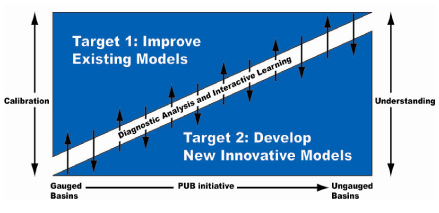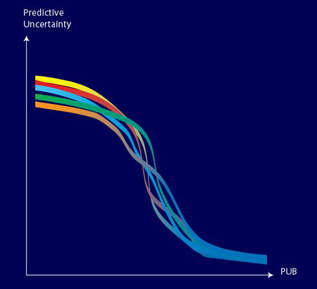Origins and Aims
PUB was initiated as a result of web-based discussions between IAHS members, and a series of IAHS-sponsored meetings in Maastricht (July 2001), Kofu (March 2002) and Brasilia (November 2002), focusing on the need to reduce predictive uncertainty in hydrological science and practice.
The key driver for this quest was the observation that - globally and regionally - hydrological regimes are changing. Global evidence strongly suggests that human activities are increasingly disrupting natural hydrological and ecological regimes, both directly and indirectly: in many areas around the world, this is leading to:
- Reductions in the security of water supplies
- Increased risks of extreme conditions of flood or drought
- Dramatic decreases in biodiversity, particularly in riparian ecosystems.
In the past, when attempting to predict streamflow and other aspects of catchment hydrology, historical conditions had been had been taken to provide the best guide to what would happen in the future, and the assumption was widely held that observations and interpretations were readily transferrable between catchments. Over the first few years of the new millennium, the realisation emerged that – in the context of the rapid and wide-ranging changes described above - neither could be relied upon any longer. This in turn implied an urgent need for a paradigm shift in approach.
PUB aims to encourage just such a shift, in the methods used to predict streamflow, sediment and water-quality variables, away from the prevailing reliance on calibration-based approaches, and towards new techniques, based primarily on improved understandings and representations of physical processes.
The movement's overall goal has been described as follows:
To formulate and implement appropriate science programmes which engage and energise the scientific community, in a co-ordinated and effective manner, towards achieving major advances in the capacity to make hydrological predictions in ungauged basins
The primary objectives of PUB are therefore -
- To improve the ability of existing hydrological models to generate reliable predictions in ungauged basins, qualified by appropriate measures of predictive uncertainty, reducing the magnitude of these wherever possible
- To develop innovative new models and approaches which are able to represent the spatial and temporal variability of hydrological processes, in order to support improved prediction in ungauged basins, with a major reduction in predictive uncertainty

This implies a need to make progress with the following tasks:
- To advance the ability of hydrologists worldwide to predict fluxes of water and associated constituents from ungauged basins, qualified by estimates of predictive uncertainty
- To advance knowledge and understanding of climatic and landscape controls on hydrological processes at all scales, in order to constrain predictive uncertainty
- To demonstrate the value of data for hydrological predictions, and provide a rational basis for future data acquisitions, including alternative data sources, by quantifying the links between data and predictive uncertainty
- To advance the scientific foundations of hydrology, and provide a scientific basis for sustainable river basin management
- To promote and encourage capacity-building activities in the development of appropriate scientific knowledge and technology to the areas and communities where it is needed most.
The initiative has been established to foster a 'programme of programmes', through which a broad pluralism of approaches may be guided towards common aims, thereby improving capabilities where they are most needed, both scientifically and geographically.

Much more detail about PUB's founding objectives and strategy will be found in:
- The PUB Science Plan (3.4Mb PDF)
- Introductory PUB Presentation (1.1Mb PDF)
